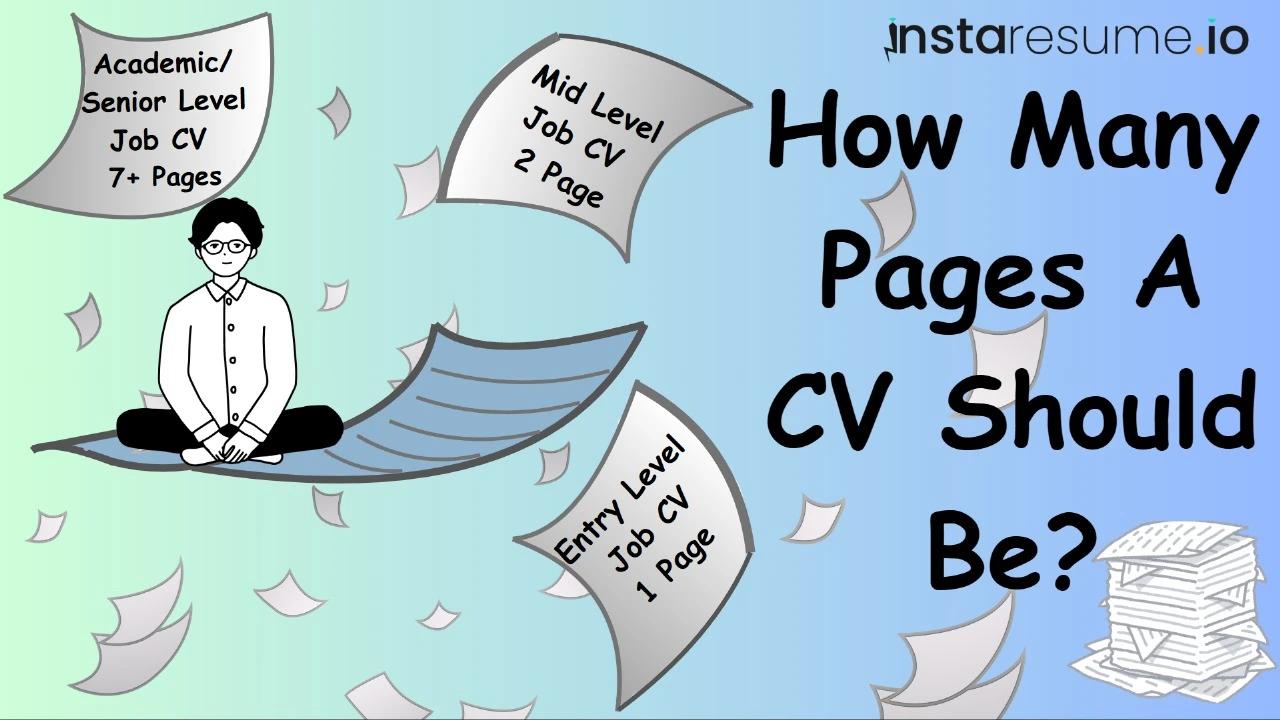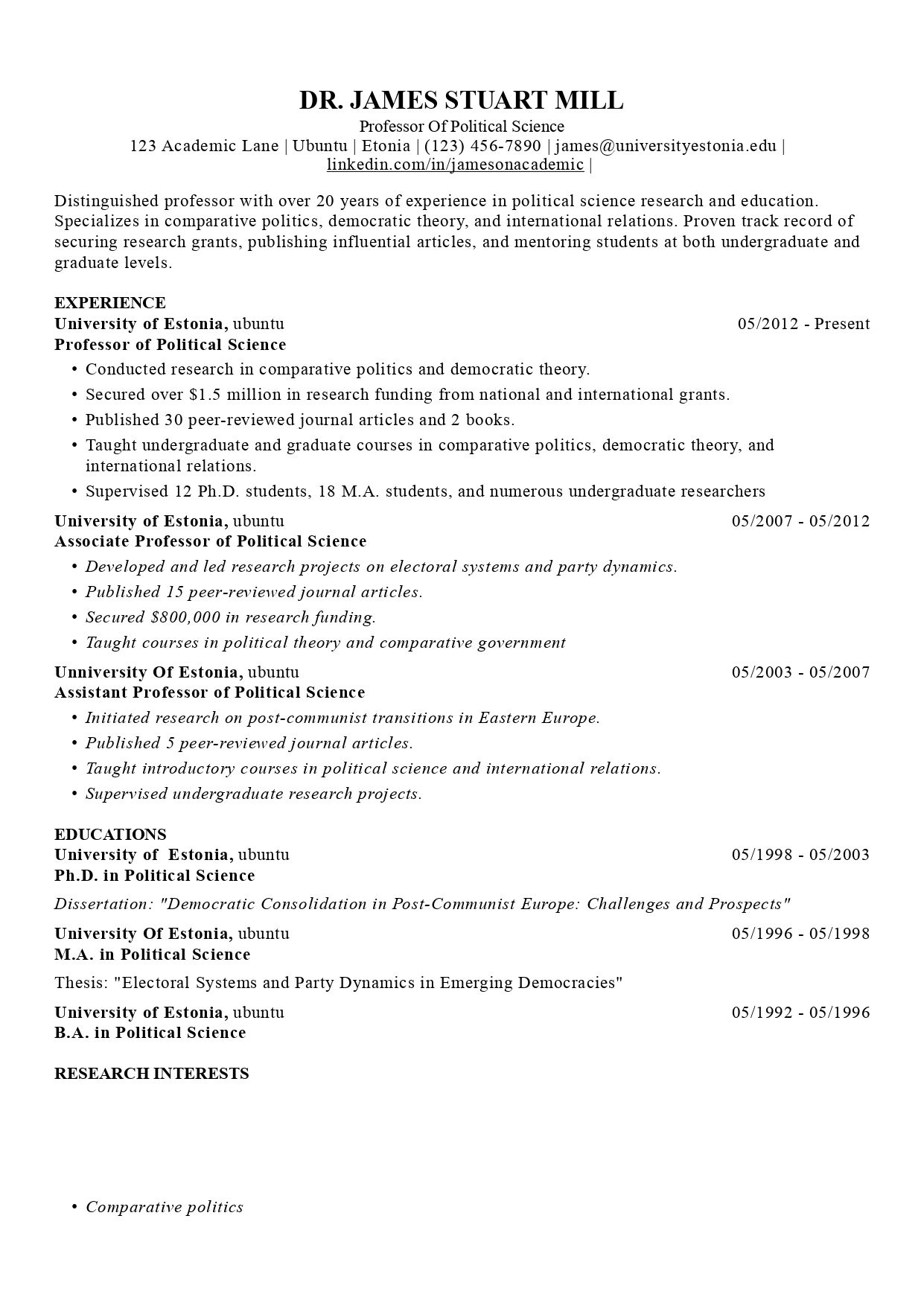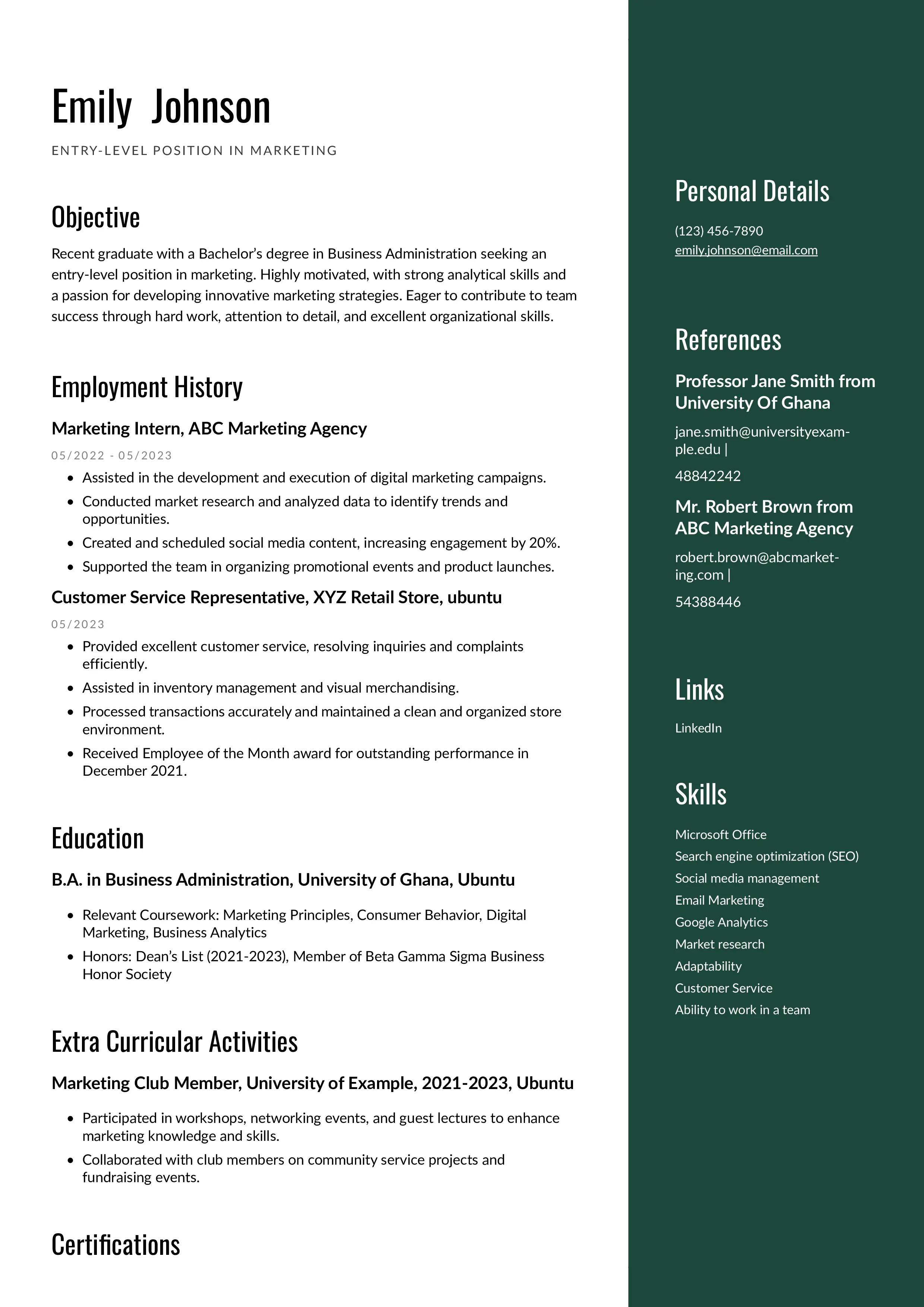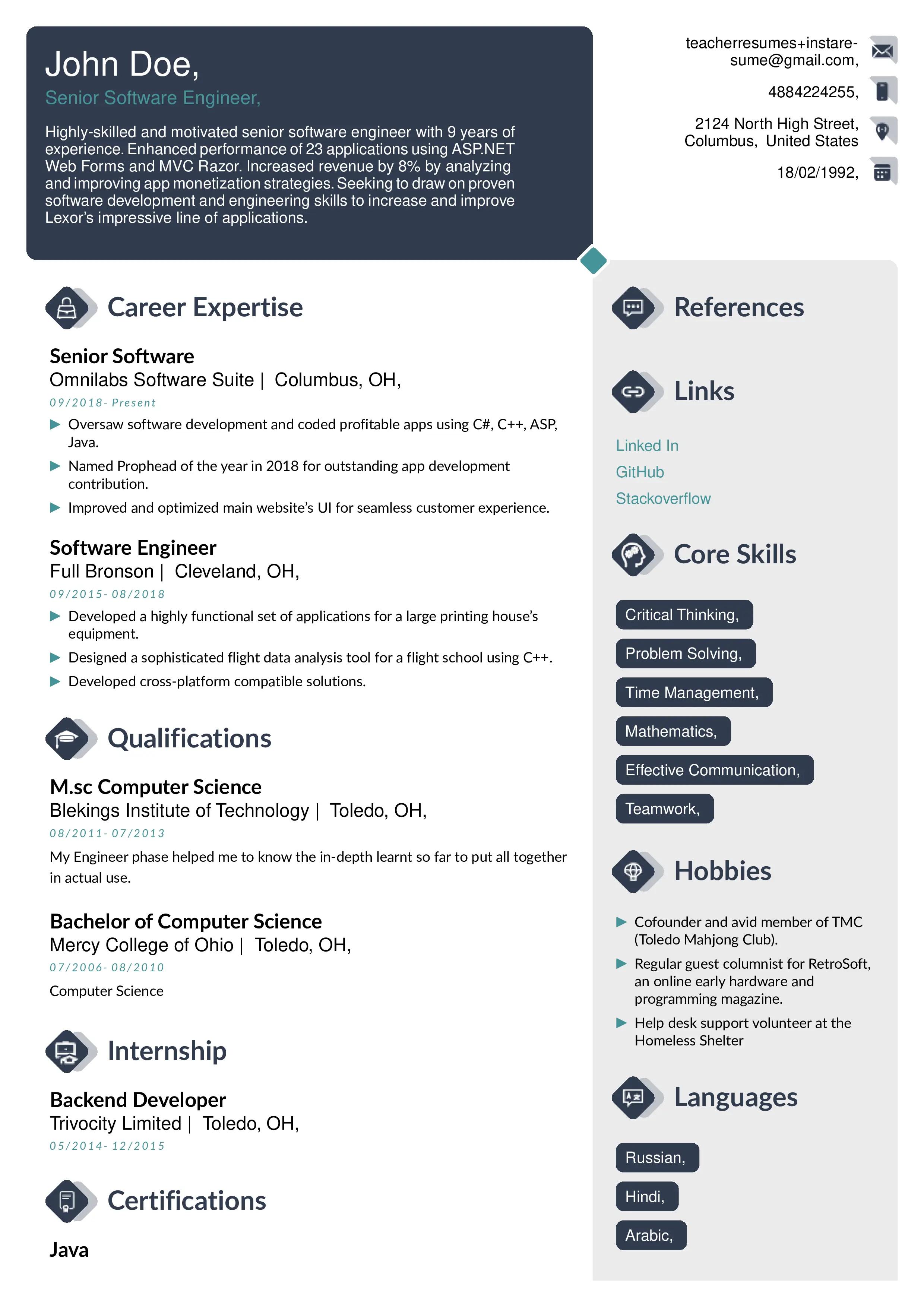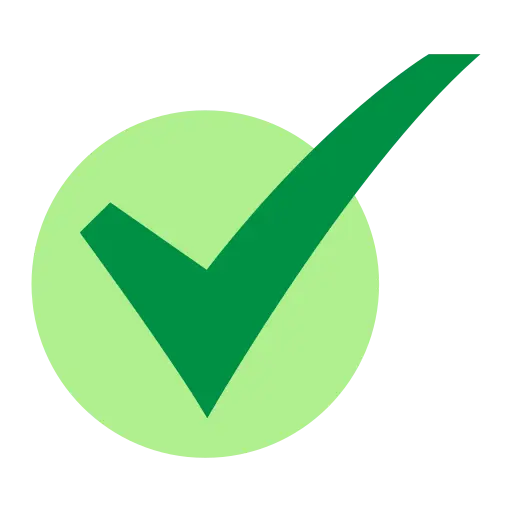How long should a CV be?
Trust Score: 4.7
366 reviews
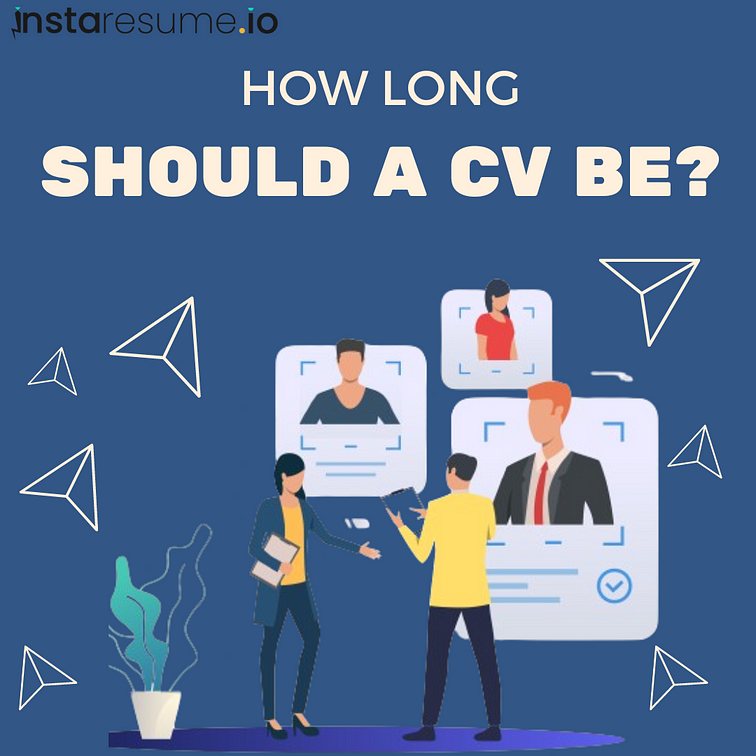
Table of Contents
p[-When it comes to job hunting, one of the most critical elements of your application is your Curriculum Vitae (CV). The CV is your first impression on potential employers, and its length can significantly impact how your qualifications are perceived.
But how long should a CV be? The answer to this question is not one-size-fits-all; it varies depending on factors such as geographic location, industry standards, and the type of application—whether it's for an academic position or a job in the corporate sector.
In this guide, we will walk you through the ideal CV length for different types of jobs and stages in your career.
What is the right CV length?
Determining the ideal length for your CV can be a challenging task, as it depends on various factors such as your career stage, the industry you're in, and the geographic location of the job you're applying for. In this section, we will break down the recommended CV lengths for different career stages and contexts, providing you with clear guidelines to help you create an effective and impactful CV.
Entry-Level applicants
Length: 1-2 pages
Details to Include: Educational background, internships, volunteer work, relevant skills, and any part-time jobs or projects that showcase your abilities.
Reason: At the beginning of your career, you likely have limited professional experience. A concise CV allows you to highlight your education and any relevant experiences without overwhelming the reader. Focus on showcasing your potential and enthusiasm for the role.
Mid-Level professionals
Length: 2-3 pages
Details to Include: Work history, significant accomplishments, additional certifications, relevant projects, and skills.
Reason: With a few years of experience under your belt, you have more to showcase. A slightly longer CV allows you to detail your professional journey and the impact you have had in your previous roles. Be selective about what to include, focusing on achievements that are most relevant to the job you are applying for.
Senior-Level executives and academics
Length: 3-5 pages or more
Details to Include: Extensive work experience, leadership roles, major projects, publications, presentations, awards, professional affiliations, and other notable contributions.
Reason: At this stage in your career, you have a wealth of experience and accomplishments. A more detailed CV is necessary to fully convey your expertise and the breadth of your career. For academics, this includes comprehensive lists of publications and research projects.
What to include in a CV?
Academic CV
Edit and download this resume example of Professor of political science created using the Instaresume's River · Harvard resume template.
This academic CV provides a comprehensive overview of a professor's qualifications in political science, emphasizing their education, professional experience, research interests, publications, grants, teaching experience, awards, professional affiliations, and references. Adjust the sections and content to fit your specific background and achievements.
An academic CV is typically more detailed and extensive than a standard job-seeking CV. It includes comprehensive information about your educational background, research experience, publications, and academic achievements. Here’s what to include:
Contact Information:
 Full name
Full name Address
Address Phone number
Phone number Email address
Email address Professional social media profiles (e.g., LinkedIn)
Professional social media profiles (e.g., LinkedIn)
Personal Statement:
 A brief summary of your academic background, research interests, and career goals.
A brief summary of your academic background, research interests, and career goals.
Education:
 List all degrees earned, including the institution, dates attended, and titles of theses or dissertations.
List all degrees earned, including the institution, dates attended, and titles of theses or dissertations. Include any relevant coursework or academic achievements.
Include any relevant coursework or academic achievements.
Research Experience:
 Detail your research projects, including your role, the institution, dates, and a brief description of the research and outcomes.
Detail your research projects, including your role, the institution, dates, and a brief description of the research and outcomes. Avoid personal pronouns.
Avoid personal pronouns. Employ action verbs.
Employ action verbs. Quantify work experiences
Quantify work experiences
Publications:
 List all publications, including journal articles, books, book chapters, and conference papers.
List all publications, including journal articles, books, book chapters, and conference papers. Include full citations.
Include full citations.
Teaching Experience:
 Describe your teaching roles, including courses taught, institutions, dates, and any notable accomplishments or innovations in your teaching methods.
Describe your teaching roles, including courses taught, institutions, dates, and any notable accomplishments or innovations in your teaching methods.
Awards and Honors:
 List academic awards, scholarships, fellowships, and other recognitions.
List academic awards, scholarships, fellowships, and other recognitions.
Professional Affiliations:
 Include memberships in academic and professional organizations.
Include memberships in academic and professional organizations.
Conferences and Presentations:
 List conferences attended, presentations given, and any roles such as session chair or panelist.
List conferences attended, presentations given, and any roles such as session chair or panelist.
Grants and Funding:
 Detail any research grants or funding received, including the amount, funding source, and purpose of the grant.
Detail any research grants or funding received, including the amount, funding source, and purpose of the grant.
References:
 Provide contact information for academic references who can speak to your qualifications and accomplishments.
Provide contact information for academic references who can speak to your qualifications and accomplishments.
Entry-Level CV
Edit and download this Entry-level position in marketing created using the Instaresume's Forest · two column resume template with side bar left.
Forest · two column resume template with side bar left template:
An entry-level CV is typically shorter and focuses on your education, relevant skills, and any work or volunteer experience you have. This Forest · two column resume template with side bar left template is perfect for any entry level job position.
Here’s what to include
Contact Information:
 Full name
Full name Address
Address Phone number
Phone number Email address
Email address LinkedIn profile (if applicable)
LinkedIn profile (if applicable)
Objective or Summary:
 A brief statement outlining your career goals and what you aim to achieve in the position you are applying for.
A brief statement outlining your career goals and what you aim to achieve in the position you are applying for.
Education:
 List your degrees, institutions, and graduation dates.
List your degrees, institutions, and graduation dates. Include any relevant coursework, projects, or academic achievements.
Include any relevant coursework, projects, or academic achievements.
Work Experience:
 Include internships, part-time jobs, and volunteer work.
Include internships, part-time jobs, and volunteer work. Detail your role, the organization, dates of employment, and key responsibilities and accomplishments.
Detail your role, the organization, dates of employment, and key responsibilities and accomplishments.
Skills:
 Highlight relevant skills, such as technical abilities, languages spoken, and soft skills like communication and teamwork.
Highlight relevant skills, such as technical abilities, languages spoken, and soft skills like communication and teamwork.
 Include involvement in clubs, sports, or other activities that demonstrate leadership, teamwork, or other valuable skills.
Include involvement in clubs, sports, or other activities that demonstrate leadership, teamwork, or other valuable skills.
 List any additional certifications or training programs completed that are relevant to the job.
List any additional certifications or training programs completed that are relevant to the job.
 Provide contact information for professional or academic references who can vouch for your abilities and character.
Provide contact information for professional or academic references who can vouch for your abilities and character.
Experienced CV
Edit and download this example resume of Sr. Software Engineer created using the Instaresume's Everest · Combined resume template.
Everest · Combined resume template
A combination resume shows off your skills and achievements, giving employers a complete picture of your capabilities. It's a powerful tool for job seekers aiming to impress recruiters.
For experienced professionals, the CV should highlight your extensive work history, achievements, and contributions to your field. Here’s what to include:
Contact Information:
 Full name
Full name Address
Address Phone number
Phone number Email address
Email address LinkedIn profile
LinkedIn profile
Professional Summary:
 A concise summary of your career, highlighting key accomplishments and your value proposition.
A concise summary of your career, highlighting key accomplishments and your value proposition.
Work Experience:
 List your job titles, companies, and dates of employment.
List your job titles, companies, and dates of employment. Detail your responsibilities, achievements, and contributions in each role, focusing on quantifiable results.
Detail your responsibilities, achievements, and contributions in each role, focusing on quantifiable results.
Education:
 Include your degrees, institutions, and graduation dates.
Include your degrees, institutions, and graduation dates. Mention any additional training or professional development relevant to your career.
Mention any additional training or professional development relevant to your career.
Skills:
 Highlight advanced skills, including technical proficiencies, leadership abilities, and industry-specific knowledge.
Highlight advanced skills, including technical proficiencies, leadership abilities, and industry-specific knowledge.
Certifications and Licenses:
 List any professional certifications, licenses, or accreditations relevant to your field.
List any professional certifications, licenses, or accreditations relevant to your field.
Professional Affiliations:
 Include memberships in industry associations or professional organizations.
Include memberships in industry associations or professional organizations.
Awards and recognitions:
 Detail any awards, honors, or recognitions received throughout your career.
Detail any awards, honors, or recognitions received throughout your career.
Projects and Initiatives:
 Highlight significant projects or initiatives you have led or contributed to, emphasizing the impact and outcomes.
Highlight significant projects or initiatives you have led or contributed to, emphasizing the impact and outcomes.
Publications and Presentations:
 If applicable, list any industry publications or conference presentations.
If applicable, list any industry publications or conference presentations.
References:
 Provide contact information for professional references who can attest to your experience and achievements.
Provide contact information for professional references who can attest to your experience and achievements.
By tailoring the content of your CV to match your career stage and the type of position you are applying for, you can create a compelling document that effectively showcases your qualifications and helps you stand out to potential employers through various cv templates that gives you modern design and formatting.
How to Make Your CV Shorter
When creating a CV, especially if you need to keep it concise, focus on including the most relevant and impactful information. Here are some tips on how to make your CV shorter without sacrificing essential details:
1. Focus on Relevance
Only include information that is directly relevant to the job you're applying for. Tailor your CV for each position:
 Work Experience: Highlight jobs and tasks that are pertinent to the role.
Work Experience: Highlight jobs and tasks that are pertinent to the role. Skills: List skills that are specifically requested in the job description.
Skills: List skills that are specifically requested in the job description. Education: Emphasize qualifications that are relevant to the job.
Education: Emphasize qualifications that are relevant to the job.
2. Be Concise
Use bullet points to make your CV more readable and breif:
 Summarize Tasks: Instead of detailed descriptions, summarize your tasks and achievements.
Summarize Tasks: Instead of detailed descriptions, summarize your tasks and achievements. Use Keywords: Incorporate keywords from the job description to make your CV ATS-friendly.
Use Keywords: Incorporate keywords from the job description to make your CV ATS-friendly.
3. Quantify Achievements
Whenever possible, use numbers to quantify your achievements, making your CV more impactful:
 Increased Engagement: “Increased social media engagement by 20%.”
Increased Engagement: “Increased social media engagement by 20%.” Improved Sales: “Boosted sales by 15% through targeted marketing campaigns.”
Improved Sales: “Boosted sales by 15% through targeted marketing campaigns.”
4. Simplify Formatting
Keep your formatting clean and simple:
 Font and Margins: Use a professional font (e.g., Arial, Calibri) and set margins to 1 inch.
Font and Margins: Use a professional font (e.g., Arial, Calibri) and set margins to 1 inch. Section Headers: Use clear headers and subheaders for each section.
Section Headers: Use clear headers and subheaders for each section.
5. Limit Length
For entry-level positions, aim for a one-page CV. For more experienced roles, a two-page CV is acceptable:
 One Page: Ideal for recent graduates or those with less experience.
One Page: Ideal for recent graduates or those with less experience. Two Pages: Suitable for more experienced professionals.
Two Pages: Suitable for more experienced professionals.
6. Combine Sections
Combine less critical sections if they don’t warrant a separate heading:
 Education and Certifications: Combine if there are only a few entries.
Education and Certifications: Combine if there are only a few entries. Skills and Languages: List together if they are both short.
Skills and Languages: List together if they are both short.
7. Remove Outdated Information
Omit older or irrelevant job experiences, especially those that don't add value to your application:
 Old Jobs: Remove jobs from over 10-15 years ago unless highly relevant.
Old Jobs: Remove jobs from over 10-15 years ago unless highly relevant. Irrelevant Roles: Exclude roles unrelated to the job you're applying for.
Irrelevant Roles: Exclude roles unrelated to the job you're applying for.
8. Avoid Redundancy
Avoid repeating similar experiences or skills across different sections:
 Skills vs. Experience: If a skill is clearly demonstrated through your work experience, you don’t need to list it separately in the skills section.
Skills vs. Experience: If a skill is clearly demonstrated through your work experience, you don’t need to list it separately in the skills section.
Career Transition or Complex Work History: Long or Short CV
When transitioning to a new career or navigating a complex work history with various roles and industries, the length of your CV depends on how relevant each experience is to your target position. If you have several relevant experiences, a longer CV may be necessary to demonstrate your diverse skill set. However, if some experiences are not directly applicable, it’s best to keep your CV concise and focused on the most relevant aspects of your background.
If you’re shifting from marketing to project management, you might include more details about your transferable skills, such as team leadership, budget management, and strategic planning, even if they come from non-project management roles. In this case, a longer CV could be beneficial to showcase your versatility.
Creative Jobs: Short CV
Creatives like graphic designers or copywriters usually supplement their CV with a portfolio. That’s why they should keep their CV short, just one or two pages, showcasing their best projects and skills. The key is to keep your CV concise while still showing off your creative flair. While crafting their short CV, they have the opportunity to infuse it with creativity, allowing their unique style to shine through.
For instance, a graphic designer might keep their CV short and snappy, using bold. colors and innovative design elements to reflect their artistic prowess.
Ultimately, the length of your CV should reflect your level of experience and qualifications. Whether it’s one page or three, ensure each section adds value and reinforces your suitability for the role.
How Long is Too Long?
So, if you decide to go with a longer CV, how long is too long? As a general rule of thumb, you shouldn’t let your CV stretch on for more than two or three pages. Anything longer than that starts to feel like overkill, and employers might lose interest before they get to the good stuff.
Deciding factors while choosing right length of your CV
Choosing the right length for your CV is crucial, as it ensures you present the most relevant information effectively without overwhelming potential employers. Here are the deciding factors to consider when determining the optimal length for your CV:
1. Experience Level
 Entry-Level Candidates: Typically, a one-page CV is sufficient for recent graduates or individuals with limited work experience. Focus on education, internships, relevant coursework, and any part-time jobs or volunteer work.
Entry-Level Candidates: Typically, a one-page CV is sufficient for recent graduates or individuals with limited work experience. Focus on education, internships, relevant coursework, and any part-time jobs or volunteer work. Mid-Level Professionals: If you have several years of experience, a one to two-page CV may be appropriate. Highlight key achievements and roles in more detail.
Mid-Level Professionals: If you have several years of experience, a one to two-page CV may be appropriate. Highlight key achievements and roles in more detail. Senior-Level Professionals: For individuals with extensive experience, a two-page CV is usually acceptable. Ensure that every entry adds significant value and relevance to the job you're applying for.
Senior-Level Professionals: For individuals with extensive experience, a two-page CV is usually acceptable. Ensure that every entry adds significant value and relevance to the job you're applying for.
2. Industry Standards
 Academia and Research: Academic CVs are often longer (two to four pages or more), as they need to include detailed information about publications, research, grants, teaching experience, and presentations.
Academia and Research: Academic CVs are often longer (two to four pages or more), as they need to include detailed information about publications, research, grants, teaching experience, and presentations. Creative Fields: Portfolios and concise CVs are often preferred, focusing on key projects, achievements, and relevant skills.
Creative Fields: Portfolios and concise CVs are often preferred, focusing on key projects, achievements, and relevant skills. Corporate Roles: Typically, a one to two-page CV is standard, focusing on measurable achievements and relevant experience.
Corporate Roles: Typically, a one to two-page CV is standard, focusing on measurable achievements and relevant experience.
3. Job Requirements
 Detailed Job Descriptions: If the job description requires detailed information about your roles and achievements, a slightly longer CV might be necessary to address all the requirements.
Detailed Job Descriptions: If the job description requires detailed information about your roles and achievements, a slightly longer CV might be necessary to address all the requirements. Basic Job Descriptions: For jobs with more general descriptions, a concise CV highlighting your most relevant experiences and skills will suffice.
Basic Job Descriptions: For jobs with more general descriptions, a concise CV highlighting your most relevant experiences and skills will suffice.
4. Relevance of Information
 Current and Relevant Experience: Prioritize recent and relevant job roles, skills, and achievements. Older or less relevant roles can be summarized or omitted.
Current and Relevant Experience: Prioritize recent and relevant job roles, skills, and achievements. Older or less relevant roles can be summarized or omitted. Irrelevant Experience: Avoid including job roles or skills that do not contribute to your suitability for the position you’re applying for.
Irrelevant Experience: Avoid including job roles or skills that do not contribute to your suitability for the position you’re applying for.
5. Achievements and Impact
 Quantifiable Achievements: Include achievements that are quantifiable and demonstrate your impact, even if it means extending the CV slightly.
Quantifiable Achievements: Include achievements that are quantifiable and demonstrate your impact, even if it means extending the CV slightly. Avoid Fluff: Ensure every point adds value. Avoid unnecessary details or vague descriptions that do not contribute to your candidacy.
Avoid Fluff: Ensure every point adds value. Avoid unnecessary details or vague descriptions that do not contribute to your candidacy.
6. Application Type
 Job Applications: Typically require concise, targeted CVs that align closely with the job description.
Job Applications: Typically require concise, targeted CVs that align closely with the job description. Academic or Grant Applications: Often require detailed CVs to showcase a breadth of research, publications, and academic contributions.
Academic or Grant Applications: Often require detailed CVs to showcase a breadth of research, publications, and academic contributions.
7. Geographical Differences
 United States: Generally, one to two pages are standard for most professionals.
United States: Generally, one to two pages are standard for most professionals. Europe: CVs can be slightly longer, especially if applying for positions within the EU which often value detailed career histories.
Europe: CVs can be slightly longer, especially if applying for positions within the EU which often value detailed career histories. Asia: The length can vary widely, but generally, detailed information about roles and achievements is valued.
Asia: The length can vary widely, but generally, detailed information about roles and achievements is valued.
8. Personal Branding
 Highlight Strengths: Ensure that the length of your CV allows you to adequately highlight your strengths and unique selling points.
Highlight Strengths: Ensure that the length of your CV allows you to adequately highlight your strengths and unique selling points. Concise Messaging: A shorter CV should still effectively communicate your qualifications and fit for the role without unnecessary verbosity.
Concise Messaging: A shorter CV should still effectively communicate your qualifications and fit for the role without unnecessary verbosity.
Practical Tips for Determining CV Length
 Review and Edit: Regularly review your CV to remove outdated or irrelevant information.
Review and Edit: Regularly review your CV to remove outdated or irrelevant information. Tailor for Each Job: Customize your CV for each application to highlight the most relevant experience and skills.
Tailor for Each Job: Customize your CV for each application to highlight the most relevant experience and skills. Seek Feedback: Get feedback from mentors, peers, or career advisors on whether your CV effectively conveys your qualifications within an appropriate length.
Seek Feedback: Get feedback from mentors, peers, or career advisors on whether your CV effectively conveys your qualifications within an appropriate length.
Conclusion
Choosing the right length for your CV depends on balancing the need to present comprehensive, relevant information with the necessity of maintaining a concise, readable format. Consider your experience level, industry standards, job requirements, and geographical expectations to determine the optimal length. Tailor your CV for each application, focusing on relevance and impact, to make the best impression on potential employers.


